- medicinapropraxi.cz - Vitamins, their functions and uses
- healthline.com - Why Is Vitamin B Complex Important, and Where Do I Get It?
- webmd.com - Health Benefits of B Complex
- pubmed.ncbi.nlm.nih.gov - Effect of vitamin B complex on neurotransmission and neurite outgrowth
- drugs.com - Vitamin B Complex 100 Side Effects
- sciencedirect.com - Pellagra
- sciencedirect.com - Niacin
Vitamin B (B-complex) and effects on the body? + Natural sources

B vitamins are essential for the proper functioning of our bodies. What are their effects and in which foods can we find them?
Article content
Their role is to ensure and regulate normal metabolism.
B vitamins belong to the group of water-soluble substances. Most of them act as coenzymes of energy metabolism. Many B vitamins are important for the formation of new cells.
The so-called B complex group includes:
- vitamin B1 - thiamine
- vitamin B2 - riboflavin
- vitamin B3 - niacin
- vitamin B5 - pantothenic acid
- vitamin B6 - pyridoxine
- vitamin B7 - biotin
- vitamin B9 - folic acid
- vitamin B12 - cobalamin

The above vitamins are often classified as complex vitamins.
However, each of them has unique effects on the human body. They play an indispensable role in the proper functioning of cell metabolism, brain function and energy production.
They must be supplemented in sufficient doses, not only from plant foods but also from animal foods.
Vitamin B deficiency can occur for a variety of reasons:
- vitamin deficiency in the diet
- nutrient absorption disorders (atrophic gastritis, celiac disease, enterocolitis, short bowel syndrome, chronic diarrhoea)
- increased consumption of nutrients (periods of growth, increased physical activity, pregnancy, excessive alcohol consumption)
In the following section, we will describe the individual B-complex vitamins.
Vitamin B1 - thiamine
Vitamin B1 is very important for the formation and growth of cells. In addition, it has many roles in our body:
- it ensures the activity of certain enzymes
- it is involved in the breakdown and utilization of sugars and starches, which provide the body with energy
- it is important for the proper function of the nervous system, muscles and heart
Vitamin B1 is used in the treatment of various diseases. In addition to complete vitamin B1 deficiency (avitaminosis) and vitamin B1 deficiency (hypovitaminosis), it is used in the treatment of the following diseases:
- non-inflammatory nerve diseases
- inflammations of the nerves
- nerve and muscle pain
- nerve palsies
- multiple sclerosis
- shingles
- psychological disorders
- alcoholism
In addition to the above diseases, it is used in the treatment of diseases associated with reduced absorption of nutrients from the intestine of various origins. Vitamin B1 is recommended to be taken during treatment with antibiotics or chemotherapeutic drugs that suppress the intestinal microflora, from which B vitamins are formed.

Vitamin B1 deficiency can be caused by excessive alcohol consumption, prolonged stress, diabetes, excessive physical exertion or occur during pregnancy.
Vitamin B1 deficiency can result in 3 syndromes:
- Dry form of beri-beri - Symptoms of the syndrome include neurological disorders with partial loss of leg muscle mobility, muscle weakness and flaccidity, and confusion. Patients have an increased susceptibility to infections.
- Moist form of beri-beri - For this type, the typical manifestations are swelling of the lower limbs and face, disturbances of the heart rhythm. The patient is forever at risk of sudden circulatory failure.
- Wernicke-Korsakoff syndrome - This syndrome occurs in alcoholics and in people who abuse narcotics. Symptoms include confusion, disorientation, double vision, impaired coordination of movements, and memory loss.
Vitamin B2 - riboflavin
Vitamin B2 is an essential building block of two coenzymes that are important for energy production, cell function, growth and development, and for the metabolism of fats and certain drugs.
In addition to these effects, vitamin B1 contributes to:
- maintaining healthy mucous membranes and skin
- maintaining good eyesight
- proper iron metabolism
- maintenance of healthy red blood cells
- optimal function of the nervous system
- proper metabolism necessary for energy production
- reducing the rate of exhaustion and fatigue
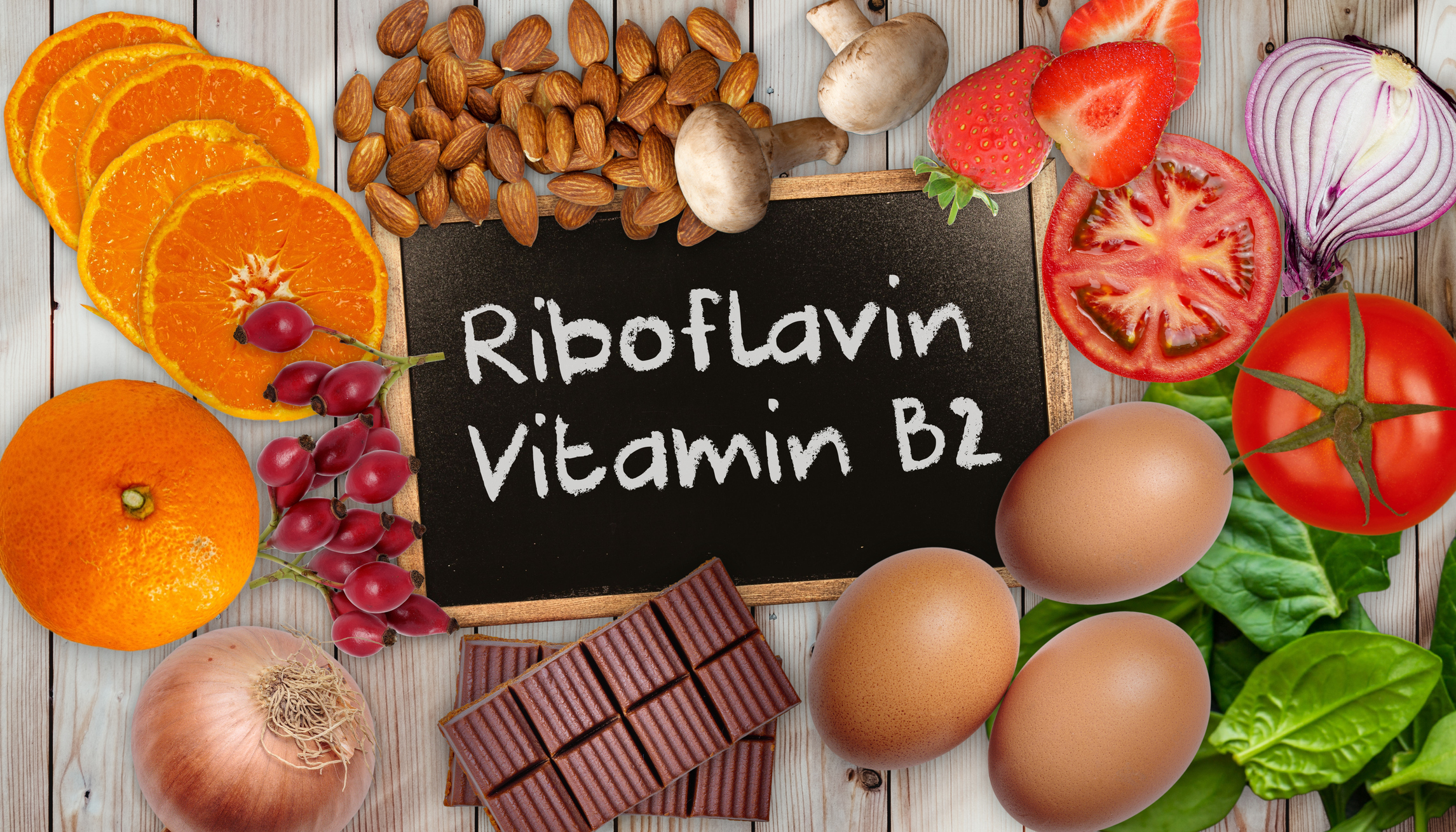
The first manifestation of vitamin B2 deficiency is the development of infectious corners. The mucous membranes of the mouth become pale, peel, and subsequently experience repeated inflammation. In some cases, swelling of the lips may occur.
Vitamin B2 deficiency can also manifest itself in the eyes by the appearance of:
- vascularisation of the cornea
- inflammation of the eyelids
- thickening of the eyelids
Cutaneous manifestations of vitamin B2 deficiency include dermatitis, seborrhoea and acne-like rashes. Patients may experience nerve dysfunction or structural damage, tingling and trembling in the legs and impaired coordination of movements.
Paediatric patients may suffer from delayed intellectual development. Adults may experience a decline in mental performance.
Vitamin B3 - niacin
Vitamin B3 is a natural part of our diet. Once absorbed, it is converted into its active form in the body. Vitamin B3 is taken to lower bad cholesterol (LDL) and raise good cholesterol (HDL).
Its use should be under medical supervision. In large doses, it can cause "niacin washout", which is caused by an increase in the size of capillaries.
This condition can lead to fatigue and can also cause liver damage.
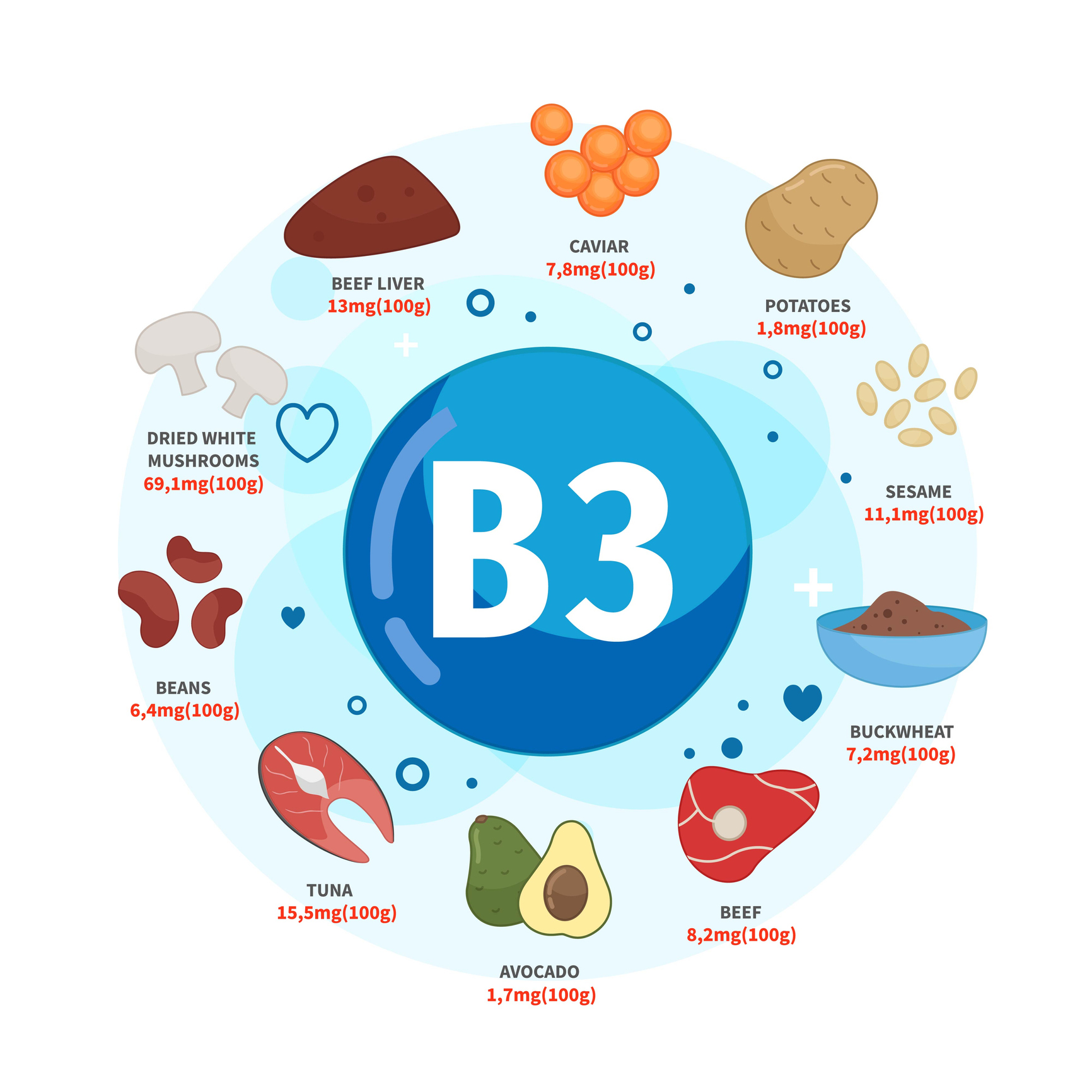
Vitamin B3 deficiency manifests itself as pellagra. Pellagra affects the digestive tract, skin and nervous system. Dermatitis, diarrhea and dementia occur in this disease.
Vitamin B5 - pantothenic acid
Vitamin B5 is an important component of many enzymes. It is part of coenzyme A, which is essential for the metabolism of sugars, fats and other substances.
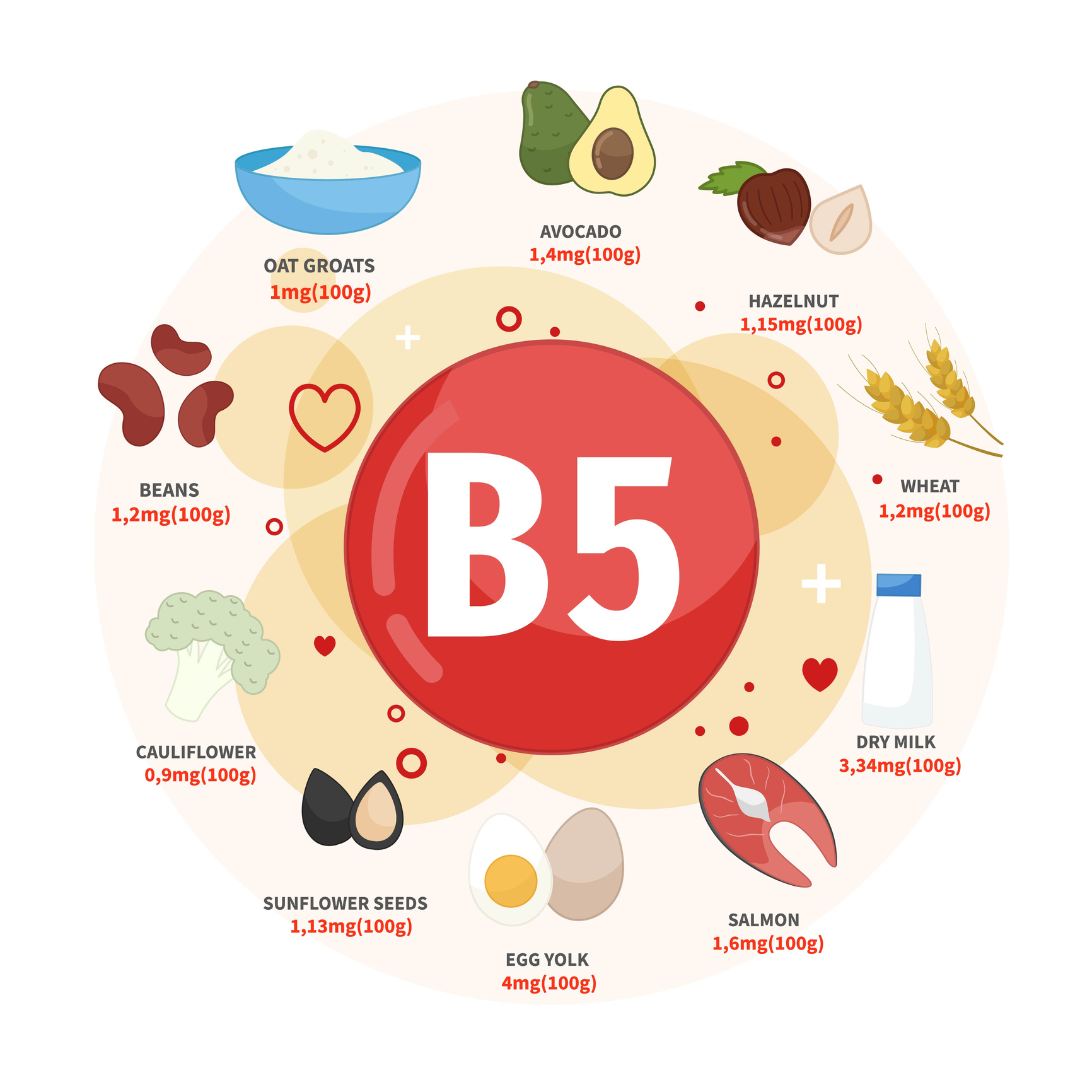
Since we get sufficient amounts of vitamin B5 from our diet, deficiency is rare. Symptoms of vitamin B5 deficiency include mainly skin symptoms (dermatitis, loss of pigment, hair loss), anaemia, general weakness and fatigue.
Vitamin B6 - pyridoxine
Vitamin B6 consists of 3 derivatives that have the same effects. Vitamin B6 is involved in many metabolic processes in the human body.
Its effects include:
- it is involved in the metabolism of amino acids
- is essential for the formation of heme
- promotes the breakdown of glycogen

Vitamin B6 deficiency is rare. It can sometimes occur together with vitamin B2 deficiency. Vitamin B6 deficiency is common in alcoholics. Symptoms include non-specific dermatitis, cramps and anaemia.
Vitamin B7 - biotin
Vitamin B7 is essential for hair quality. In addition, it is involved in various metabolic processes.
Vitamin B7 contributes to:
- the proper functioning of the nervous system
- normal functioning of energy metabolism
- good mental function
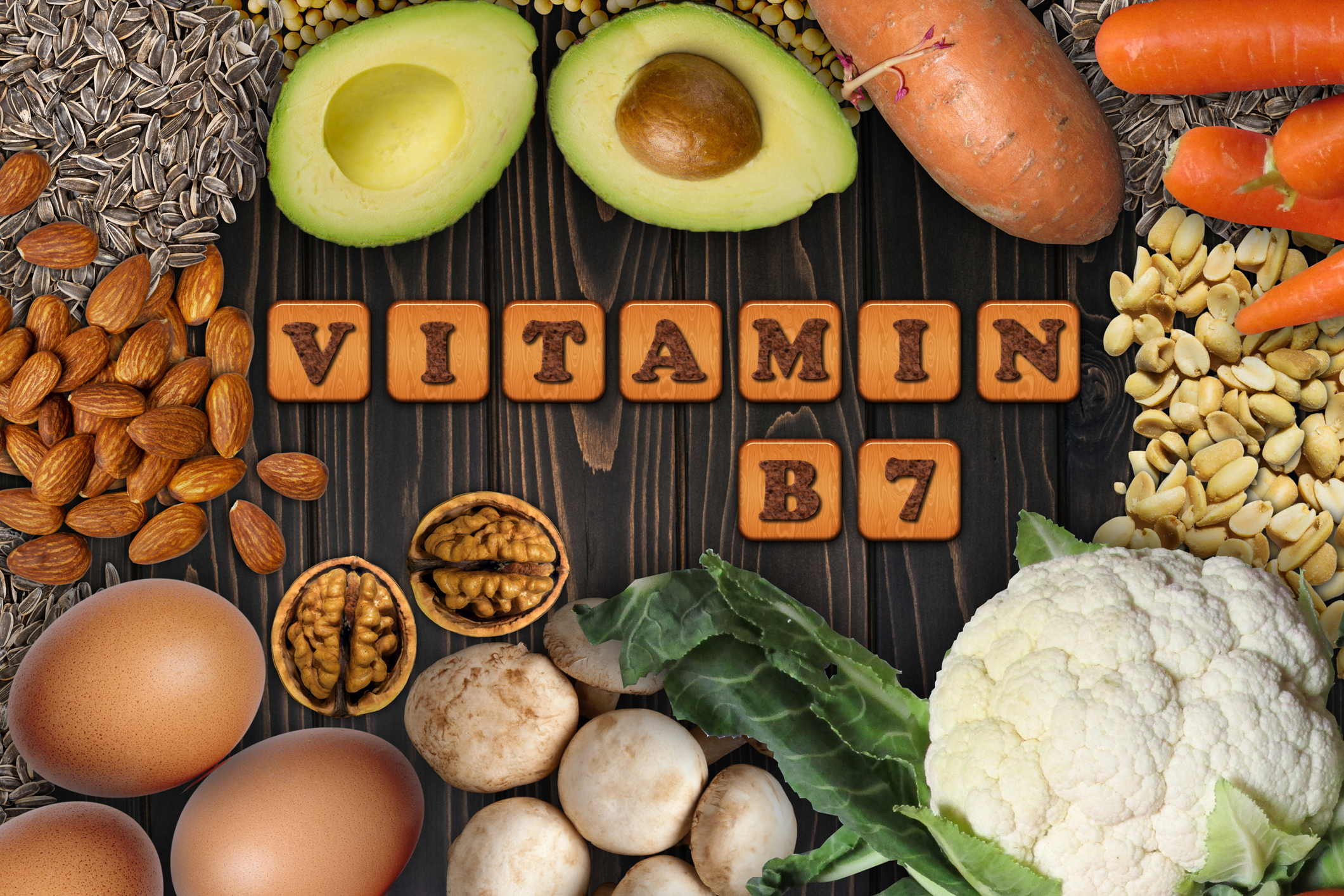
Since vitamin B7 is taken in sufficient quantities from the diet and is also produced by the microflora, vitamin B7 deficiency is very rare. It can manifest itself in rashes in the eyebrows and on the face. Occasionally, patients may experience muscle weakness.
Vitamin B9 - folic acid
Vitamin B9 is important for proper cell division.
The effects of vitamin B9 include:
- DNA and RNA production
- prevention of fetal damage during pregnancy
- participation in the formation of red blood cells

Vitamin B9 deficiency is mainly manifested in rapidly dividing cells. Clinical symptoms include megaloblastic anemia, decreased platelet count (thrombocytopenia) and decreased white blood cell count (leukopenia).
Non-specific manifestations include growth disturbances, inflammation in the oral cavity, gastrointestinal disturbances, general weakness and fatigue. In pregnancy, vitamin B9 deficiency is associated with a fetal neural tube defect.
Vitamin B12 - cobalamin
Vitamin B12 is the only vitamin that contains cobalt. Vitamin B12 is very important for the proper formation of red blood cells, neurological function and DNA formation. In addition to these functions, it is very important for the growth of children.
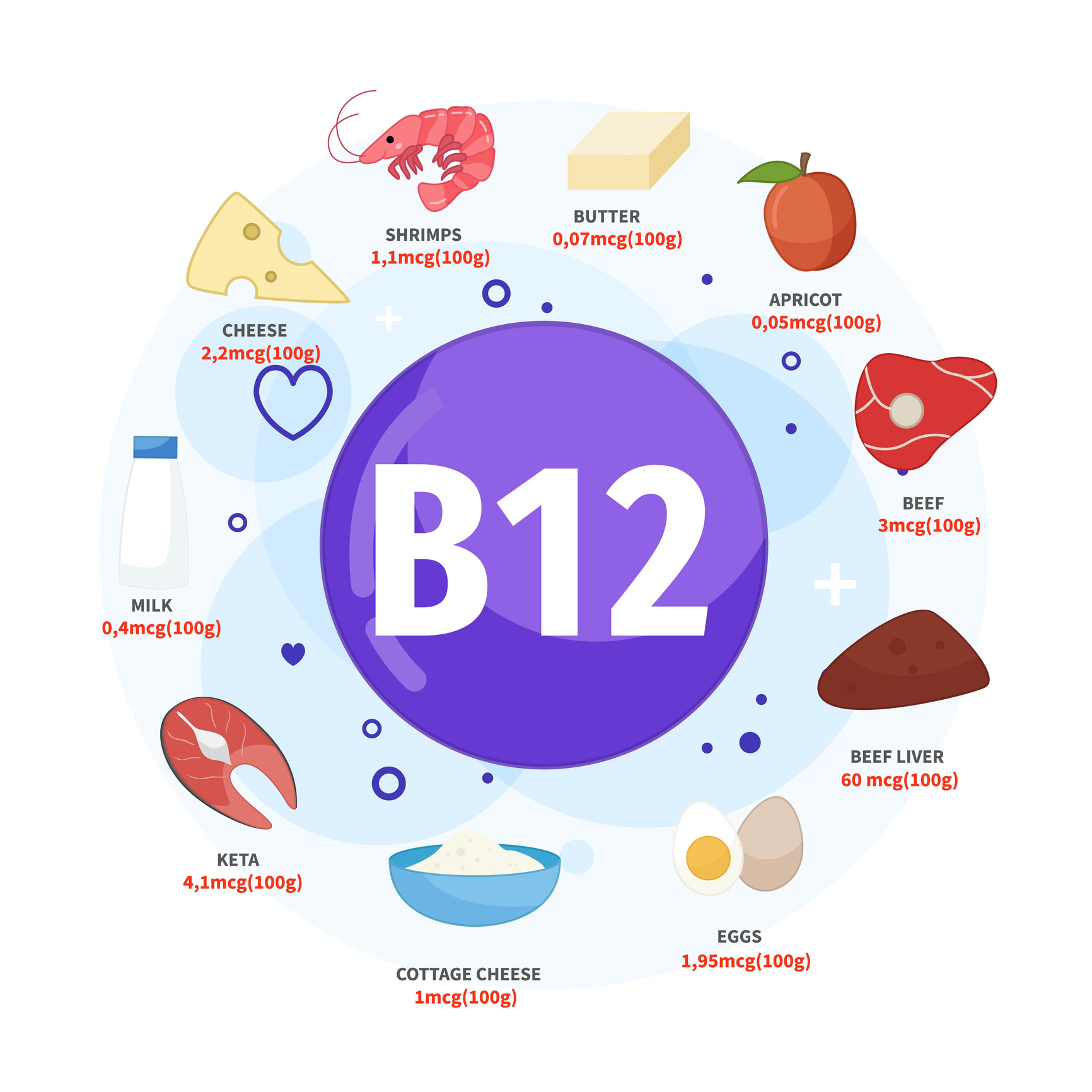
Vitamin B12 deficiency can occur in vegetarians or vegans who do not eat dairy products and eggs. Symptoms of vitamin B12 deficiency include pernicious anemia, functional or structural nerve damage, and growth retardation.
Interesting resources










